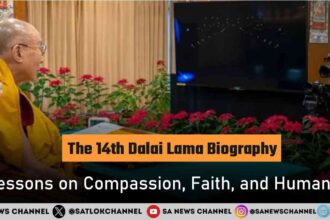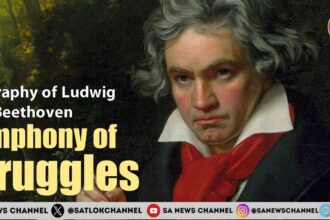Archbishop Desmond Tutu was more than just a religious leader – he was a fearless activist, a Nobel laureate, and a symbol of peace in a divided world. His unwavering fight against apartheid in South Africa and his lifelong dedication to human rights make him one of the most revered leaders of the 20th century.
- Key Facts
- Early Life and Education
- How to Become a Priest: The Journey
- The Fight Against Apartheid
- The Nobel Peace Prize
- Archbishop of Cape Town
- The Commission on Reconciliation and the Truth
- A Global Voice for Justice
- Key Principles & Philosophies
- Legacy: What Desmond Tutu Left Behind
- Sant Rampal Ji Maharaj’s Fight Against Discrimination Echoes Desmond Tutu’s Struggle
- Frequently Asked Questions about Desmond Tutu Biography
Key Facts
- Born in South Africa in 1931, he became Cape Town’s first Black Anglican Archbishop.
- For his work against apartheid, he was awarded the Nobel Peace Prize in 1984.
- Advocate for human rights, equality, and reconciliation.
- Known as “The Arch,” he was a father figure of peace and hope.
Early Life and Education
On October 7, 1931, Desmond Mpilo Tutu was born in Klerksdorp, South Africa. He was subjected to racial discrimination as a child, but he never allowed it to dampen his spirit. Tutu initially intended to become a doctor, but due to financial difficulties, he turned to teaching and eventually studied theology.
In 1960, Desmond Tutu received his ordination as an Anglican priest.
How to Become a Priest: The Journey
He stood out because of his strong faith and deep compassion. He studied theology in London, where he further developed his vision for a just society.
The Fight Against Apartheid
Apartheid was a system of legally enforced racial discrimination in South Africa. Tutu became a leading voice against it, using non-violent resistance and his position in the church to amplify the voices of the oppressed.
From the 1960s through the 1970s, Tutu’s roles in the church gave him both a platform and moral authority. He served in teaching posts, in Lesotho, and in the Anglican Church structure. In 1975, he was made Dean of St. Mary’s Cathedral in Johannesburg—the first Black South African to hold that position.
His public voice grew louder when he became General Secretary of the South African Council of Churches (SACC) in 1978. The SACC was one of the few Christian organisations with standing to challenge the system openly, and under Tutu’s leadership it spoke—powerfully—against apartheid’s brutality and injustice.
Tutu emphasised non-violent protest, international solidarity, and economic pressure as means to end apartheid. He was critical both of the system of racial oppression and the churches and institutions that remained silent. His moral clarity and fearless stance drew both admiration and risk.
The Nobel Peace Prize
Desmond Tutu was honored with the Nobel Peace Prize in 1984 for his unwavering efforts to end apartheid. This honor brought global attention to the struggle in South Africa and strengthened the movement for justice.
Archbishop of Cape Town
He became Cape Town’s first Black Anglican Archbishop in 1986. It was viewed as a turning point in history and a sign of hope by millions of South Africans.
Also Read: From Coronation to Controversy: The Biography of Queen Elizabeth II
The Commission on Reconciliation and the Truth
After apartheid ended, Tutu chaired the Truth and Reconciliation Commission, promoting forgiveness and reconciliation in a deeply wounded nation. His belief in reconciliation was rooted in his spirituality and humanity.
A Global Voice for Justice
From speaking out against poverty and corruption to advocating for LGBTQ+ rights, Tutu worked worldwide for human rights. His moral courage inspired leaders and citizens around the world.
Key Principles & Philosophies
To understand why Desmond Tutu remains such a resonant figure, it’s important to grasp the philosophical and spiritual foundations of his struggle:
- Nonviolence & Forgiveness: Unlike some liberation movements, Tutu’s approach leaned heavily on nonviolent methods, moral persuasion, and international pressure. Forgiveness was not about forgetting; it was about acknowledging truths and building forward.
- Ubuntu & Human Dignity: The idea that we are interconnected; our humanity depends on each other. Tutu believed that oppression harms everyone – not only the oppressed but also the oppressor and society at large.
- Courage to Speak Truth to Power: Whether the enemy was apartheid, or later corruption or discrimination, Tutu did not hesitate to challenge those in authority. His moral voice was both prophetic and compassionate.
- Interfaith & Global Perspective: Though his base was his Christian faith and the Anglican Church, Tutu’s concerns extended globally – to human rights wherever they were violated. He believed in universal justice.
Legacy: What Desmond Tutu Left Behind
Desmond Tutu passed away on 26 December 2021, in Cape Town, aged 90. His death was met with outpourings of grief and gratitude, nationally and internationally.
But beyond mourning, his legacy lives on in many concrete and intangible ways:
- Truth and Reconciliation Institution
The TRC model influenced restorative justice initiatives worldwide. Its procedures, its moral framing, and its emphasis on giving voice to victims have become reference points in post-conflict societies. - Moral Standard for Activism
Tutu showed that faith and activism need not be separate, and that moral clarity can coexist with gentleness and humour. He left behind speeches, sermons, writings that continue to inspire new generations. - Honours & Remembrance
Tutu received many awards: the 1984 Nobel Peace Prize, the Templeton Prize (2013), the Presidential Medal of Freedom (2009), among others. Institutions, schools, libraries are named after him. - Critical Voice in Democracy
Even after apartheid ended, Tutu remained unafraid to critique the inequalities, corruption, and failures to deliver on promised social justice. That independent stance reinforces the idea that justice is continuous, not concluded. - An Example of Reconciliation & Forgiveness
Perhaps the most enduring legacy is Tutu’s example of how one can hold on to truth and justice while also embracing forgiveness, compassion, and human unity.
Sant Rampal Ji Maharaj’s Fight Against Discrimination Echoes Desmond Tutu’s Struggle
Desmond Tutu dedicated his life to fighting apartheid and injustice, yet many only began to remember and honour him after his passing. His struggle teaches us that standing with truth is most meaningful during a leader’s lifetime, not just in memory. Similarly, Sant Rampal Ji Maharaj Ji is fearlessly raising his voice today against casteism, blind faith, religious discrimination, and social evils. He is working tirelessly to unite humanity under the true devotion of Supreme God Kabir Sahib.
Just like Tutu, Sant Rampal Ji Maharaj Ji’s mission is about equality, compassion, and justice. The lesson is clear: remembering after someone is gone does not bring change. If we truly value truth and humanity, we must support Sant Rampal Ji Maharaj Ji now, while he continues his fight for society’s upliftment and the salvation of souls.
Frequently Asked Questions about Desmond Tutu Biography
Q1. Who was Desmond Tutu?
Desmond Tutu, an Anglican bishop and recipient of the Nobel Peace Prize, was a South African anti-apartheid activist.
Q2. Why did Desmond Tutu receive the Peace Prize at the ceremony for the Nobel Prize?
He received an award in 1984 for his nonviolent resistance to South African apartheid.
Q3. What was his contribution after apartheid ended?
He worked for national reconciliation and presided over the Truth and Reconciliation Commission.
Q4. When did Desmond Tutu pass away?
He passed away on December 26, 2021, at the age of 90.
Q5. What is his greatest legacy?
His legacy is his fight for equality, peace, and reconciliation, which has inspired people around the world.








